Beth Kephart's Blog, page 24
March 29, 2016
Launching a monthly memoir newsletter; let us know if you are interested
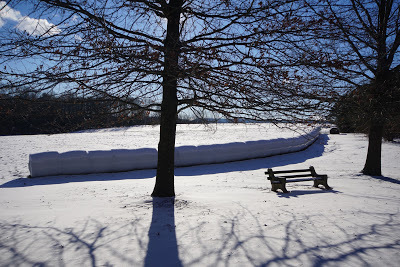 <!-- /* Font Definitions */ @font-face {font-family:Cambria; panose-1:2 4 5 3 5 4 6 3 2 4; mso-font-charset:0; mso-generic-font-family:auto; mso-font-pitch:variable; mso-font-signature:3 0 0 0 1 0;} /* Style Definitions */ p.MsoNormal, li.MsoNormal, div.MsoNormal {mso-style-parent:""; margin:0in; margin-bottom:.0001pt; mso-pagination:widow-orphan; font-size:12.0pt; mso-bidi-font-size:10.0pt; font-family:"Times New Roman"; mso-ascii-font-family:Cambria; mso-ascii-theme-font:minor-latin; mso-fareast-font-family:Cambria; mso-fareast-theme-font:minor-latin; mso-hansi-font-family:Cambria; mso-hansi-theme-font:minor-latin; mso-bidi-font-family:"Times New Roman"; mso-bidi-theme-font:minor-bidi;} @page Section1 {size:8.5in 11.0in; margin:1.0in 1.25in 1.0in 1.25in; mso-header-margin:.5in; mso-footer-margin:.5in; mso-paper-source:0;} div.Section1 {page:Section1;} </style><br />--> <blockquote class="tr_bq"><div class="MsoNormal"><span style="font-family: "courier new" , "courier" , monospace;"><b><span style="color: #76a5af;">We know when we start to exaggerate.We know when we “lie” to make things fit or to make the story turn out a certain, perfectly symmetrical, deeply self-congratulatory way.We know when what we write will not resonate with others who have lived the adventure alongside us.We know what we are doing.</span></b></span></div></blockquote>Next Monday, we'll release the first issue of a monthly newsletter dedicated to the art of memoir.<br /><br />I'll be sharing thoughts about essential memoirs (you <i>must </i>read this), about the making of memoir, and about the things I continue to learn as I teach and write the form. And I'll be sharing (with the authors' permission) some of the work we produce at <a href="http://junctureworkshops.com/"&g... Workshops.</a><br /><br />Interested? Share your email address in the comment form here, or through the private messaging of my Facebook or Twitter accounts.<div class="feedflare">
<!-- /* Font Definitions */ @font-face {font-family:Cambria; panose-1:2 4 5 3 5 4 6 3 2 4; mso-font-charset:0; mso-generic-font-family:auto; mso-font-pitch:variable; mso-font-signature:3 0 0 0 1 0;} /* Style Definitions */ p.MsoNormal, li.MsoNormal, div.MsoNormal {mso-style-parent:""; margin:0in; margin-bottom:.0001pt; mso-pagination:widow-orphan; font-size:12.0pt; mso-bidi-font-size:10.0pt; font-family:"Times New Roman"; mso-ascii-font-family:Cambria; mso-ascii-theme-font:minor-latin; mso-fareast-font-family:Cambria; mso-fareast-theme-font:minor-latin; mso-hansi-font-family:Cambria; mso-hansi-theme-font:minor-latin; mso-bidi-font-family:"Times New Roman"; mso-bidi-theme-font:minor-bidi;} @page Section1 {size:8.5in 11.0in; margin:1.0in 1.25in 1.0in 1.25in; mso-header-margin:.5in; mso-footer-margin:.5in; mso-paper-source:0;} div.Section1 {page:Section1;} </style><br />--> <blockquote class="tr_bq"><div class="MsoNormal"><span style="font-family: "courier new" , "courier" , monospace;"><b><span style="color: #76a5af;">We know when we start to exaggerate.We know when we “lie” to make things fit or to make the story turn out a certain, perfectly symmetrical, deeply self-congratulatory way.We know when what we write will not resonate with others who have lived the adventure alongside us.We know what we are doing.</span></b></span></div></blockquote>Next Monday, we'll release the first issue of a monthly newsletter dedicated to the art of memoir.<br /><br />I'll be sharing thoughts about essential memoirs (you <i>must </i>read this), about the making of memoir, and about the things I continue to learn as I teach and write the form. And I'll be sharing (with the authors' permission) some of the work we produce at <a href="http://junctureworkshops.com/"&g... Workshops.</a><br /><br />Interested? Share your email address in the comment form here, or through the private messaging of my Facebook or Twitter accounts.<div class="feedflare"><a href="http://feeds.feedburner.com/~ff/BethK... src="http://feeds.feedburner.com/~ff/BethK..." border="0"></img></a> <a href="http://feeds.feedburner.com/~ff/BethK... src="http://feeds.feedburner.com/~ff/BethK..." border="0"></img></a> <a href="http://feeds.feedburner.com/~ff/BethK... src="http://feeds.feedburner.com/~ff/BethK..." border="0"></img></a> <a href="http://feeds.feedburner.com/~ff/BethK... src="http://feeds.feedburner.com/~ff/BethK..." border="0"></img></a>
</div>
Published on March 29, 2016 04:48
March 26, 2016
let's not toss entire categories; one more defense of YA (celebrating Cordelia Jensen and e.E. Charlton-Trujillo)
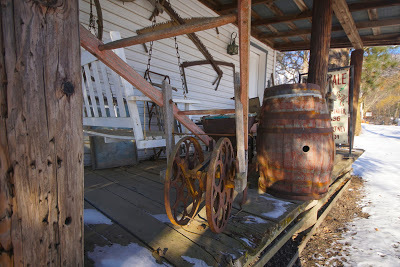 One wonders if it will ever end. The cast-the-entire-category-aside comments from those who cannot abide YA. The idea that all literature written with teens at its heart is literature of a lesser-than status.
One wonders if it will ever end. The cast-the-entire-category-aside comments from those who cannot abide YA. The idea that all literature written with teens at its heart is literature of a lesser-than status.Look. I'm uncomfortable with much of what is sold to teens—uncomfortable with books that forget how intelligent teens are, books that neglect the complexity of teen lives, books that don't embrace history or ideas or culture or the environment or real, abundant pressures as they also introduce characters and plot, books that don't investigate the power of language itself. I'm uncomfortable with easy. I'm uncomfortable with marketing machines that are motivated solely by the brass ring of commercial success, which is not always the same thing as the gold ring of genuine meaning.
But I'm also uncomfortable with the idea that all YA is to be shelved far below "real" books and that those who write it are second-rate dabblers. I'm a believer in seeking out the best in every genre—the best poems, the best history, the best biographies, the best "adult" novels, the best picture books, the best memoirs, the best middle grade, the best YA. Because there is, in fact, a great YA out there. There are people who are making the most of this very elastic form to write ferociously about kids who need their stories told.
Last week, at Books of Wonder, I bought Cordelia Jensen's teen novel-in-verse, Skyscraping, a true work of art about which you'll be reading more about here.
Not long ago, I read e.E. Charlton-Trujillo's When We Was Fierce, another novel in verse that is so deeply grounded in e.E.'s understanding of kids who need and deserve a voice. "If we can agree that the finest story-making erupts from impassioned empathy and a willingness to bend the rules of language," I wrote, after I read it, "then we must agree that e.E. Charlton-Trujillo ranks among our very finest story-makers. This is a lyric manifest that commands us to hear, so that we might have a chance at being healed."
You know how I feel about the other extraordinary YA writers in my real and reading life; I've written about them here. You know, too, how despairing I can get when literature devolves into gimmickry or merely brand-able ideas.
But let's evaluate each single book for what it might be and not dispense with entire categories.
And let's be kinder to each other.




Published on March 26, 2016 05:18
March 24, 2016
on seeing LOVE at the Philadelphia International Airport for the first time
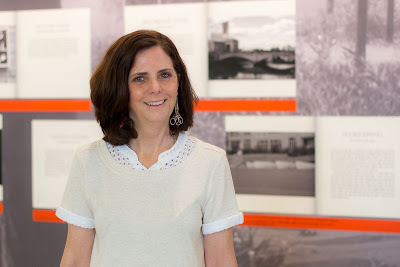
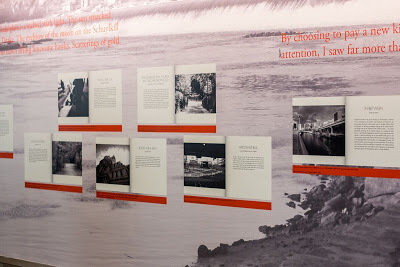
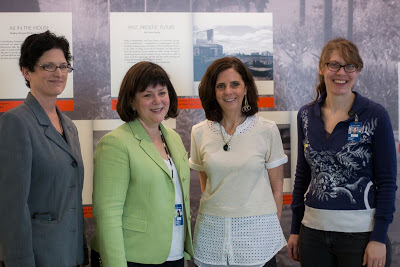
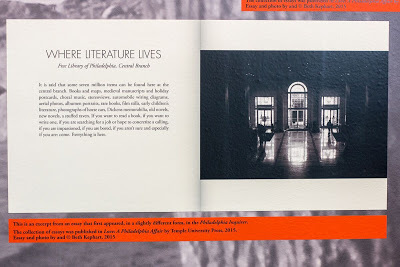
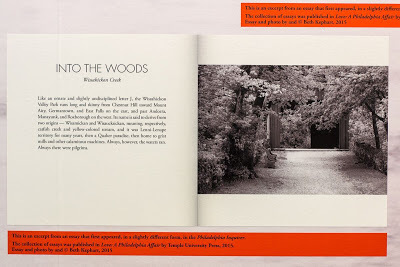
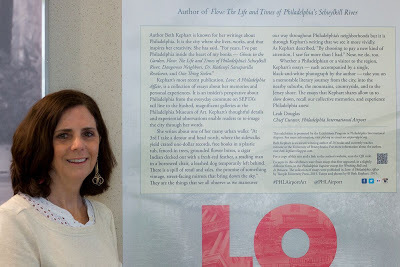
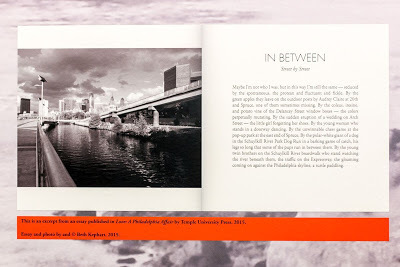
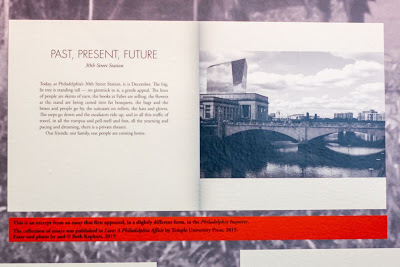
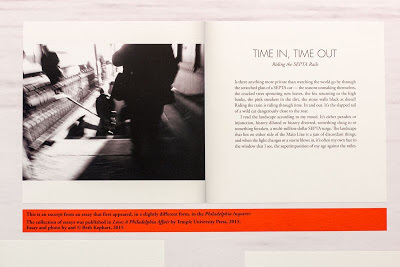
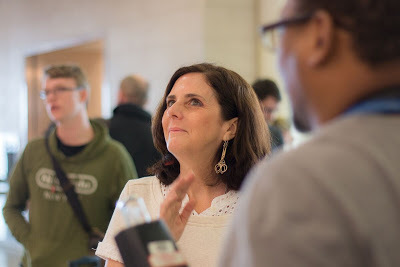
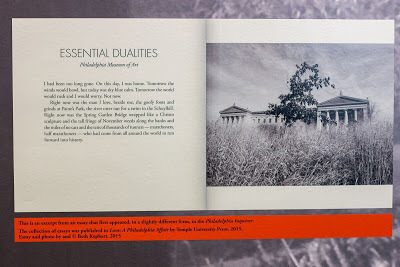 Today was the day. Long-awaited. More wonderful than imagined. With greatest thanks to Leah Douglas and Ursula Stuby of the Philadelphia International Airport Exhibitions Program for their glorious interpretation of
Love: A Philadelphia Affair
(Temple University Press), now on exhibit at Terminal D (10). How glorious it was to spend time with these two wonderful women, and to spend time as well with the Airport's delightful CEO, Chellie Cameron—learning about the plans for this airport and the future of travel in my beloved city.
Today was the day. Long-awaited. More wonderful than imagined. With greatest thanks to Leah Douglas and Ursula Stuby of the Philadelphia International Airport Exhibitions Program for their glorious interpretation of
Love: A Philadelphia Affair
(Temple University Press), now on exhibit at Terminal D (10). How glorious it was to spend time with these two wonderful women, and to spend time as well with the Airport's delightful CEO, Chellie Cameron—learning about the plans for this airport and the future of travel in my beloved city.With thanks to my father, for joining us, and to Bill, for taking the photographs you see here. I'll be forever honored by this.




Published on March 24, 2016 12:52
The Leaving/Tara Altebrando: reflections by my student, Emma Connolly
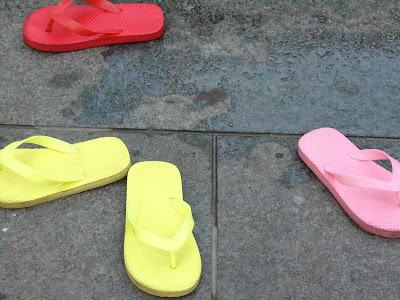
When I talk about my students at the University of Pennsylvania—when I speak of their commitment to our work and to our community, the quality of their search and the depth of their answers, their sentences on the page—I am reflecting on what I love best about the school that once educated and now employs me. I am looking past the rumors and gossip and seeing straight into the heart of young goodness.
Because that goodness resolutely lives.
This semester I have again been blessed by the company of young people and their great talent. A few of my students have brought to class not just an interest in poetry or memoir or fiction (or song writing, architecture, economics, rock climbing, medicine, you name it), but a specific interest in young adult literature—an interest that has been heightened by my uber-cool Penn colleague (and YA writer), Melissa Jensen. I've extended an invitation to any in the class to read from the library of new books that make their way to me—and to offer, here, their thoughts.
In this case, Emma Connolly—a young woman who practically defined memoir in her expectations essay, a young woman now looking ahead to a no-doubt stellar career (at least to start) as a middle grade teacher—took home my copy of Tara Altebrando's new and thrilling book, The Leaving (Bloomsbury, forthcoming). I'd blurbed the book for Tara. I wanted Emma's thoughts. Here, in Emma's words, is what The Leaving is all about.
You see what I mean about talent? Intelligence? Can you imagine Emma as the teacher she will be?
This is the Penn I love.
(And I love Tara, too.)
Who are you without your memories? For the characters of Tara Altebrando’s engrossing, twisting, mysterious, “The Leaving,” this is not a hypothetical question. When five teenagers are dropped off in an abandoned playground eleven years after they went missing, they are celebrated and intensely questioned. Where were they? Who took them? And how can they be telling the truth that they don’t remember any of it? As Scarlett and Lucas, two victims of the event known as “The Leaving,” and Avery, the left-behind sister of the only victim who has not returned, try to solve their own history, Altebrando confronts questions of identity, family, and memory. When Scarlett returns home to a mother who has attributed her disappearance to alien activity, she can’t shake the feeling that they are the ones who are from different planets. What if you don’t fit in where you’re supposed to? Lucas is disturbed by the discovery of skills that he must have learned during his absence. Can you be afraid of your past self? Meanwhile, Avery watches their return unfold as she continues to deal with the devastation that her brother’s disappearance has had on her family. Would she be better off like the victims of the “The Leaving,” able to essentially skip over a difficult childhood? The characters discover unfinished leads from passed-away relatives and potential clues from past selves. They chase after jerkily recovered blips of memory that Altebrando visually represents by scattering words all over the page and interrupting the narrative with blocks of remembered images. With each revelation, we are drawn deeper into the search for answers before being thwarted yet again. Each time the story approaches acceptance of the fact that one might simply be better off not remembering, though, Altebrando reminds us, “Forgetting meant not knowing, meant ignorance, meant maybe making the same mistakes again and again.” So we keep searching, unable to leave this book until the very last page.




Published on March 24, 2016 04:33
March 23, 2016
get a sneak peek at THIS IS THE STORY OF YOU — here and now
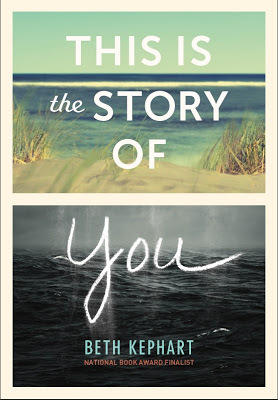 A sneak peek of THIS IS THE STORY OF YOU. Here. And now.
A sneak peek of THIS IS THE STORY OF YOU. Here. And now.Oh. I hope you like it so much you'll want to read the whole thing.
(I like it. A lot.)
Thanks for considering.




Published on March 23, 2016 10:53
March 22, 2016
the New York City High Line, at last


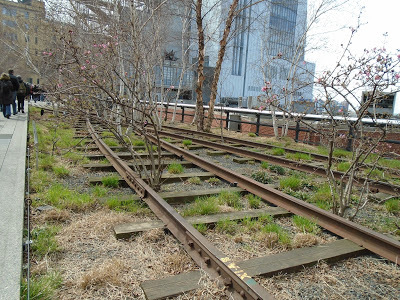 Our son's move to New York City has opened many doors for us. "We're coming," we'll say, and he'll have ideas. Steer us to new places, make sure we're never lost when we emerge from subway stations, get us to the Chelsea Market, which I hadn't realized I'd been missing all my life.
Our son's move to New York City has opened many doors for us. "We're coming," we'll say, and he'll have ideas. Steer us to new places, make sure we're never lost when we emerge from subway stations, get us to the Chelsea Market, which I hadn't realized I'd been missing all my life.This past weekend, among many other things, our son introduced us to the High Line, a walk I've wanted to take since this 1.5 mile stretch of former railroad tracks was reinvented as an urban escape. Weaving over rail yards, through the shadows of rising towers and old churches (or at least one old church), beneath the branches of soon-to-be-blooming trees, and beside bold art, this was my kind of slice of urban paradise.
Pedestrians—and the industrial past—are being honored in cities across the country. I'm dismayed by so much that is part of our right now.
But this delights me.




Published on March 22, 2016 05:12
March 21, 2016
This Is the Story of You, a first blog review
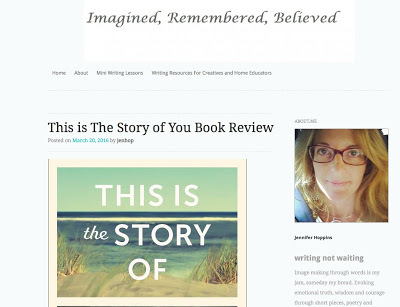 The days leading up to the launch of a book can be excruciating.
The days leading up to the launch of a book can be excruciating.Does anyone know the book exists? Will anyone care? How will the book find its way in the world? Will readers find in those pages what you hoped to write into those pages—in this case, the story of the compassion and community that arise in the wake of a monster storm on the Jersey shore?
This past weekend, thanks to the New York City Teen Authors Festival (and David Levithan), I had the opportunity to read the first page and a half of This Is the Story of You to a beautiful gathering at the New York Public Library, as part of a panel that also featured Carolyn Mackler, Luanne Rice, and Francisco X. Stork (and David). On Sunday afternoon, I saw the book in a bookstore for the first time, thanks to the mega Books of Wonder signing.
When I returned from New York, I learned that Jennifer Hoppins, a beautiful writer who had received Story as part of a giveaway, had been working on a review of the book for her blog, Imagined, Remembered, Believed. It's a rather extraordinary review—a weaving together of fictions and personal truths, a gorgeously written post about life and loves.
I share it here. With gratitude to Jennifer for making this season of waiting less lonely, and for allowing me to exhale.
Thank you.




Published on March 21, 2016 02:08
March 20, 2016
on seeing THIS IS THE STORY OF YOU for the first time in a bookstore
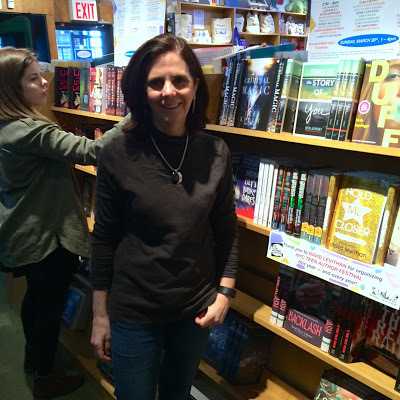 Today, at Books of Wonder, in a store crowded with readers, writers, friends.
Today, at Books of Wonder, in a store crowded with readers, writers, friends.A happy end to a good NYC weekend. All thanks to David Levithan—for everything. Including being the very first person on this planet who bought a copy of this book.




Published on March 20, 2016 15:01
March 18, 2016
getting into the publishing business—our conversation at Penn
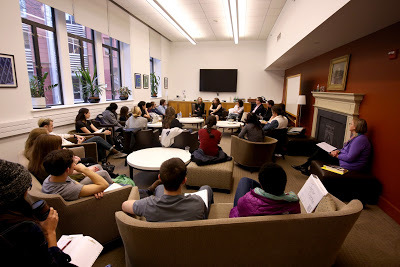 Yesterday afternoon, in the faculty lounge of Penn's English Department, we talked about editing, agenting, and publishing with students who are intrigued by the career possibilities. Alyssa Eisner Henkin (Trident Media), Alison Weiss (Sky Pony Press), Dave Borgenicht (Quirk Books), and Josh Getzler (Hannigan Salky Getzler Agency) sketched the paths they've taken toward the positions they currently hold. The entrepreneurial spirit that is required to foster and launch ideas. The courage one needs to follow a hunch, and to proceed with passions. The ability to listen for trends but to know (no matter what the big chains might say) what has the power to disrupt publishing-as-usual. I know how much I learned sitting there. I was grateful on behalf of the students, whose questions inspired us. Many thanks to Penn, to Zack Lesser, and to Deb Burnham, our host for the day.
Yesterday afternoon, in the faculty lounge of Penn's English Department, we talked about editing, agenting, and publishing with students who are intrigued by the career possibilities. Alyssa Eisner Henkin (Trident Media), Alison Weiss (Sky Pony Press), Dave Borgenicht (Quirk Books), and Josh Getzler (Hannigan Salky Getzler Agency) sketched the paths they've taken toward the positions they currently hold. The entrepreneurial spirit that is required to foster and launch ideas. The courage one needs to follow a hunch, and to proceed with passions. The ability to listen for trends but to know (no matter what the big chains might say) what has the power to disrupt publishing-as-usual. I know how much I learned sitting there. I was grateful on behalf of the students, whose questions inspired us. Many thanks to Penn, to Zack Lesser, and to Deb Burnham, our host for the day.I'm off now to New York City, where so much (but, talk to Dave of Quick, not all) of publishing happens, to join David Levithan and those dozens upon dozens of teen authors for the final days of New York City Teen Author Festival. This afternoon, at the New York Public Library, 4:40, I'm joining Francisco X. Stork, Luanne Rice, Carolyn Mackler, and David Levithan for a conversation about perspective—how we adults return to and tap into our teen selves as we write. On Sunday, I'll be joining dozens of other writers for a mass signing at Books of Wonder (I sign at 2:30).
We'd love to see you there.




Published on March 18, 2016 04:31
March 17, 2016
reading natural history is a political act
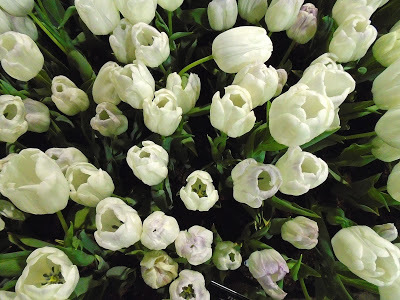 In these hazy days of ongoing exhaustion, I've turned to natural history and science—cures in the face of mind-boggling news. In particular, I've been reading Andrea Wulf's The Invention of Nature, the much-lauded biography of Alexander von Humboldt; re-reading Rebecca Solnit's Wanderlust; and settling in with a book that has long sat unread on my shelf, Peter Matthiessen's The Snow Leopard.
In these hazy days of ongoing exhaustion, I've turned to natural history and science—cures in the face of mind-boggling news. In particular, I've been reading Andrea Wulf's The Invention of Nature, the much-lauded biography of Alexander von Humboldt; re-reading Rebecca Solnit's Wanderlust; and settling in with a book that has long sat unread on my shelf, Peter Matthiessen's The Snow Leopard.On every page of these very different books lie warnings about what happens when we ignore the interconnectivity of man and nature, trees and air, the rhythms of our bodies and the patterns of our thoughts. Narrow ambition is mostly catastrophic. An incapacity for awe is inhumane. A trampling of others as we advance ourselves will have unbearable, forseeable consequences. The future of us depends on looking close, and listening well.
It's a political season. Let natural history be our guide.




Published on March 17, 2016 07:57



